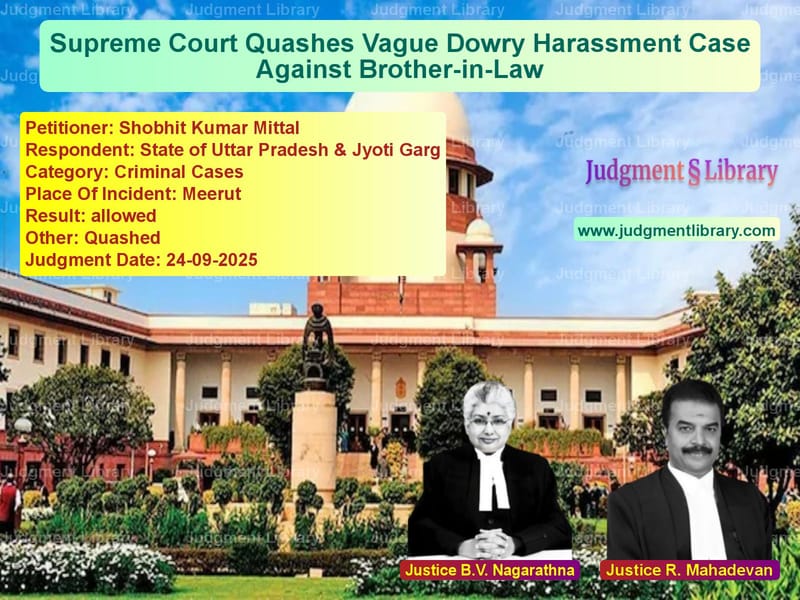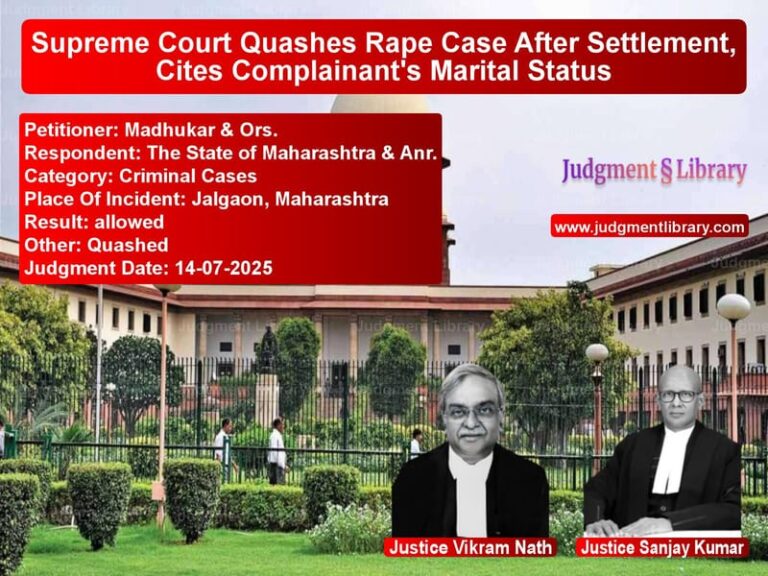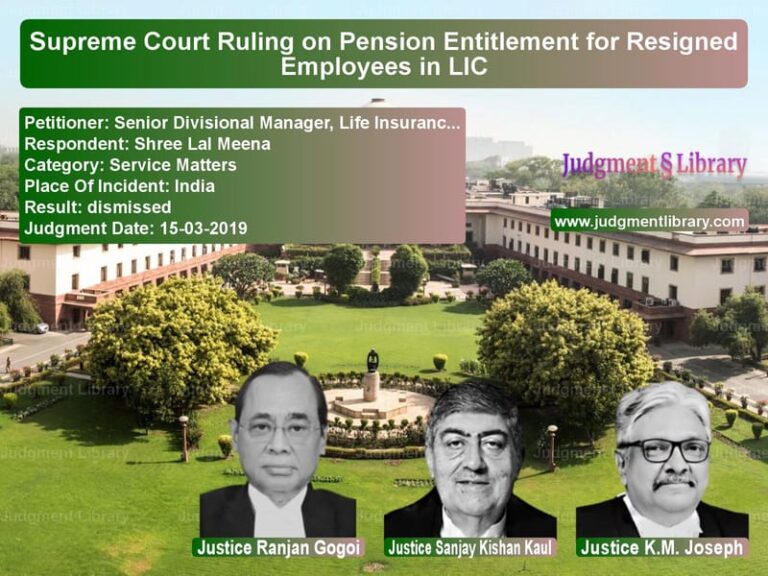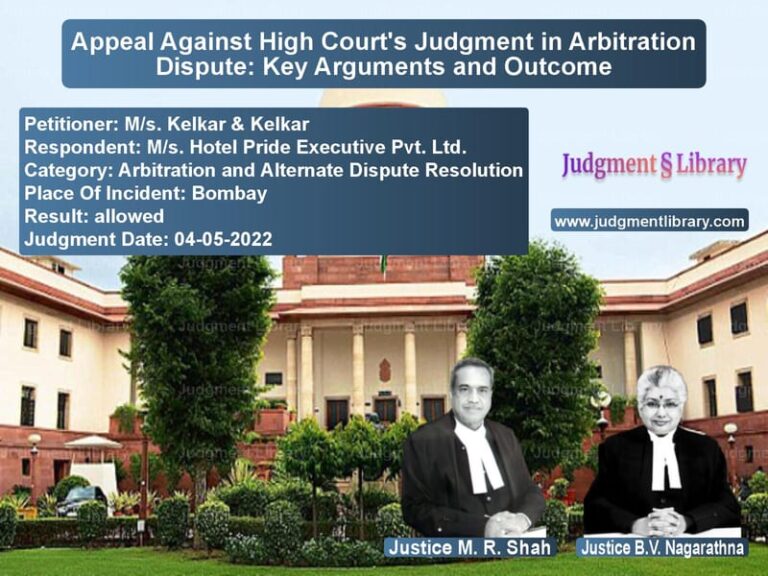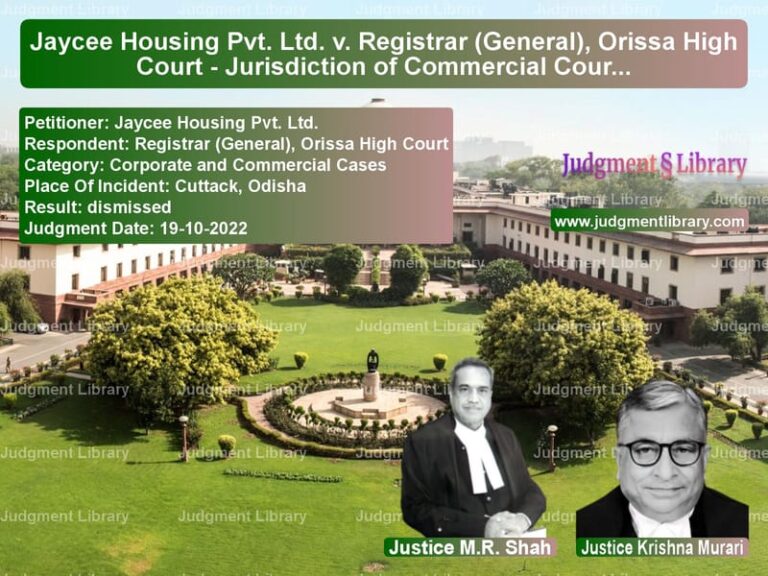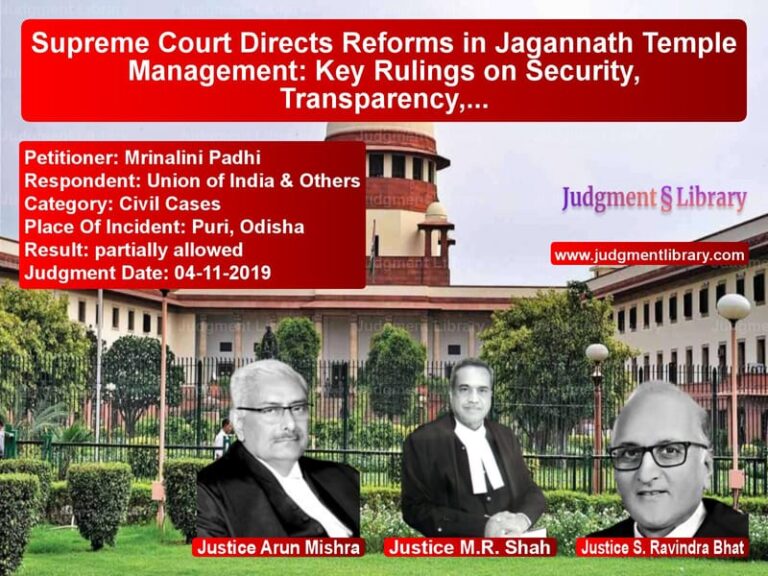Supreme Court Quashes Vague Dowry Harassment Case Against Brother-in-Law
In a significant judgment that highlights the growing concern over misuse of dowry harassment laws, the Supreme Court of India recently quashed criminal proceedings against a brother-in-law in a matrimonial dispute case. The ruling came as a relief to Shobhit Kumar Mittal, who had been implicated in an FIR filed by his sister-in-law along with her husband and mother-in-law. The Court found the allegations to be vague, omnibus, and lacking specific details, making this case a crucial precedent for protecting innocent family members from being unnecessarily dragged into matrimonial disputes.
The case originated from an FIR registered on November 9, 2023, at Police Station Civil Lines, Meerut, by Jyoti Garg against her husband Mohit Mittal, mother-in-law Shashi Mittal, and brother-in-law Shobhit Kumar Mittal. The complainant had alleged offenses under Sections 323 and 498A of the Indian Penal Code and Sections 3 and 4 of the Dowry Prohibition Act. According to her allegations, she faced harassment for dowry within ten days of her marriage in May 2014 and eventually left her matrimonial home after a few months due to marital discord. She claimed that due to repeated harassment related to dowry, a vein in her brain burst in December 2022, leading to paralysis of her right hand and right leg, requiring physiotherapy.
The appellant, Shobhit Kumar Mittal, approached the Allahabad High Court seeking quashing of the FIR, but the High Court refused to interfere with the criminal proceedings through its order dated February 27, 2024. The High Court observed that although the prayer was to quash the FIR, the appellant primarily sought protection under Section 41A of CrPC, and that a prima facie case of commission of cognizable offense was made out from the FIR. Aggrieved by this decision, the appellant approached the Supreme Court, which ultimately found merit in his contentions.
The Supreme Court, in its analysis, made several crucial observations about the nature of the allegations and the requirements for maintaining criminal proceedings in such cases. The bench comprising Justice B.V. Nagarathna and Justice R. Mahadevan carefully examined the FIR and found it lacking in specific details. The Court noted that the allegations were vague and omnibus, without any particular instances of harassment being described. The complainant had failed to mention the time, date, place, or manner in which the alleged harassment occurred, nor had she provided details about the nature of the dowry demand or its particulars.
In its significant observations, the Court stated: “A bare perusal of the FIR shows that the allegations made by complainant/respondent No.2 are vague and omnibus. Other than claiming that the husband and his family along with the accused/appellant herein mentally harassed her with a demand for dowry, the complainant/respondent No.2 has not provided any specific details or described any particular instance of harassment.” The Court further emphasized that “merely stating that the accused/appellant has mentally harassed the complainant/respondent No.2 with respect to a demand for dowry does not fulfill the ingredients of Section 498A of IPC specially in absence of any cogent material or evidence on record to substantiate the said allegations.”
The judgment delved deep into the legal requirements for establishing offenses under Sections 323 and 498A of IPC and Sections 3 and 4 of the Dowry Prohibition Act. The Court explained that Section 498A deals with cruelty by husband or relatives of husband towards the wife, while Section 323 deals with punishment for voluntarily causing hurt. The Dowry Prohibition Act provisions deal with penalty for giving or taking dowry and demanding dowry. However, the Court found that none of these offenses were made out against the appellant based on the vague allegations in the FIR.
The Supreme Court relied heavily on its landmark judgment in State of Haryana vs. Bhajan Lal (1992), particularly the categories of cases where the High Court can exercise its extraordinary power to quash FIRs. The Court found that the present case fell under the first category mentioned in Bhajan Lal, where “the allegations made in the first information report or the complaint, even if they are taken at their face value and accepted in their entirety do not prima facie constitute any offence or make out a case against the Accused.”
Read also: https://judgmentlibrary.com/supreme-court-quashes-rape-case-citing-vengeful-motive-and-legal-malice/
In a particularly significant part of the judgment, the Court quoted from its recent decision in Dara Lakshmi Narayana vs. State of Bihar (2025), where it had observed: “A mere reference to the names of family members in a criminal case arising out of a matrimonial dispute, without specific allegations indicating their active involvement should be nipped in the bud. It is a well-recognised fact, borne out of judicial experience, that there is often a tendency to implicate all the members of the husband’s family when domestic disputes arise out of a matrimonial discord.”
The Court expressed serious concern about the growing tendency to misuse legal provisions in matrimonial disputes. It observed: “In recent years, as there have been a notable rise in matrimonial disputes across the country, accompanied by growing discord and tension within the institution of marriage, consequently, there has been a growing tendency to misuse provisions like Section 498A of the IPC as a tool for unleashing personal vendetta against the husband and his family by a wife.” However, the Court was careful to clarify that it was not suggesting that genuine victims should remain silent, but was only cautioning against misuse of legal provisions in cases like the present one.
The Supreme Court emphasized the need for courts to be cautious in dealing with matrimonial disputes. It stated: “Courts have to be careful and cautious in dealing with complaints and must take pragmatic realities into consideration while dealing with matrimonial disputes where the allegations have to be scrutinized with great care and circumspection in order to prevent miscarriage of justice and abuse of process of law.” The Court further noted that in cases involving allegations of cruelty and harassment, there would normally be a series of offending acts that need to be specifically spelt out by the complainant against the perpetrators.
In its concluding remarks, the Court set aside the impugned order of the High Court and quashed the FIR and all consequent proceedings, but only qua (with respect to) the appellant Shobhit Kumar Mittal. The Court made it clear that its observations would not affect any other proceedings pending between the parties, which would be decided on their own merits. This careful limitation of the ruling shows the Court’s awareness that while the brother-in-law might have been wrongly implicated, the proceedings against the husband and mother-in-law could continue based on their own merits.
This judgment serves as an important reminder about the need for specificity in criminal complaints, especially in matrimonial disputes where there’s a tendency to implicate entire families. It balances the need to protect genuine victims of dowry harassment while preventing the misuse of legal provisions to harass innocent family members. The Supreme Court’s emphasis on concrete allegations and specific instances rather than vague and general accusations sets a significant precedent for lower courts to follow while dealing with similar cases. The ruling reinforces the principle that criminal law should not be used as a tool for settlement of personal scores and that the courts must carefully scrutinize complaints to prevent abuse of the legal process.
Petitioner Name: Shobhit Kumar Mittal.Respondent Name: State of Uttar Pradesh & Jyoti Garg.Judgment By: Justice B.V. Nagarathna, Justice R. Mahadevan.Place Of Incident: Meerut.Judgment Date: 24-09-2025.Result: allowed.
Don’t miss out on the full details! Download the complete judgment in PDF format below and gain valuable insights instantly!
Download Judgment: shobhit-kumar-mittal-vs-state-of-uttar-prade-supreme-court-of-india-judgment-dated-24-09-2025.pdf
Directly Download Judgment: Directly download this Judgment
See all petitions in Dowry Cases
See all petitions in Domestic Violence
See all petitions in Fraud and Forgery
See all petitions in Other Cases
See all petitions in Judgment by B.V. Nagarathna
See all petitions in Judgment by R. Mahadevan
See all petitions in allowed
See all petitions in Quashed
See all petitions in supreme court of India judgments September 2025
See all petitions in 2025 judgments
See all posts in Criminal Cases Category
See all allowed petitions in Criminal Cases Category
See all Dismissed petitions in Criminal Cases Category
See all partially allowed petitions in Criminal Cases Category

